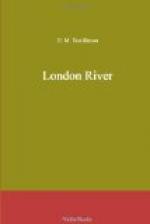Well, nobody who has ever surprised that light in Dockland will be persuaded that it is not there still, and will remain. But what could strangers see of it? The foreshore to them is the unending monotony of grey streets, sometimes grim, often decayed, and always reticent and sullen, that might never have seen the stars nor heard of good luck; and the light would be, when closely looked at, merely a high gas bracket on a dank wall in solitude, its glass broken, and the flame within it fluttering to extinction like an imprisoned and crippled moth trying to evade the squeeze of giant darkness and the wind. The narrow and forbidding by-path under that glim, a path intermittent and depending on the weight of the night which is trying to blot it out altogether, goes to Wapping Old Stairs. Prince Rupert once went that way. The ketch Nonsuch, Captain Zachary Gillam, was then lying just off, about to make the voyage which established the Hudson’s Bay Company.
It is a path, like all those stairs and ways that go down to the River, which began when human footsteps first outlined London with rough tracks. It is a path by which the descendants of those primitives went out of London, when projecting the original enterprise of their forbears from Wapping to the Guinea Coast and Manitoba. Why should we believe it is different today? The sea does not change, and seamen are what they were if their ships are not those we admired many years ago in the India Docks. It is impossible for those who know them to see those moody streets of Dockland, indeterminate, for they follow the River, which run from Tooley Street by the Hole-in-the-Wall to the Deptford docks, and from Tower Hill along Wapping High Street to Limehouse and the Isle of Dogs, as strangers would see them. What could they be to strangers? Mud, taverns, pawnshops, neglected and obscure churches, and houses that might know nothing but ill-fortune.




